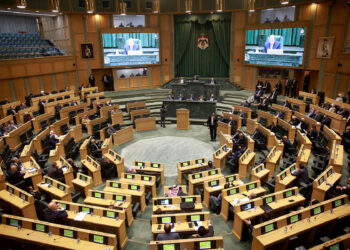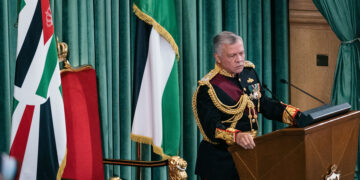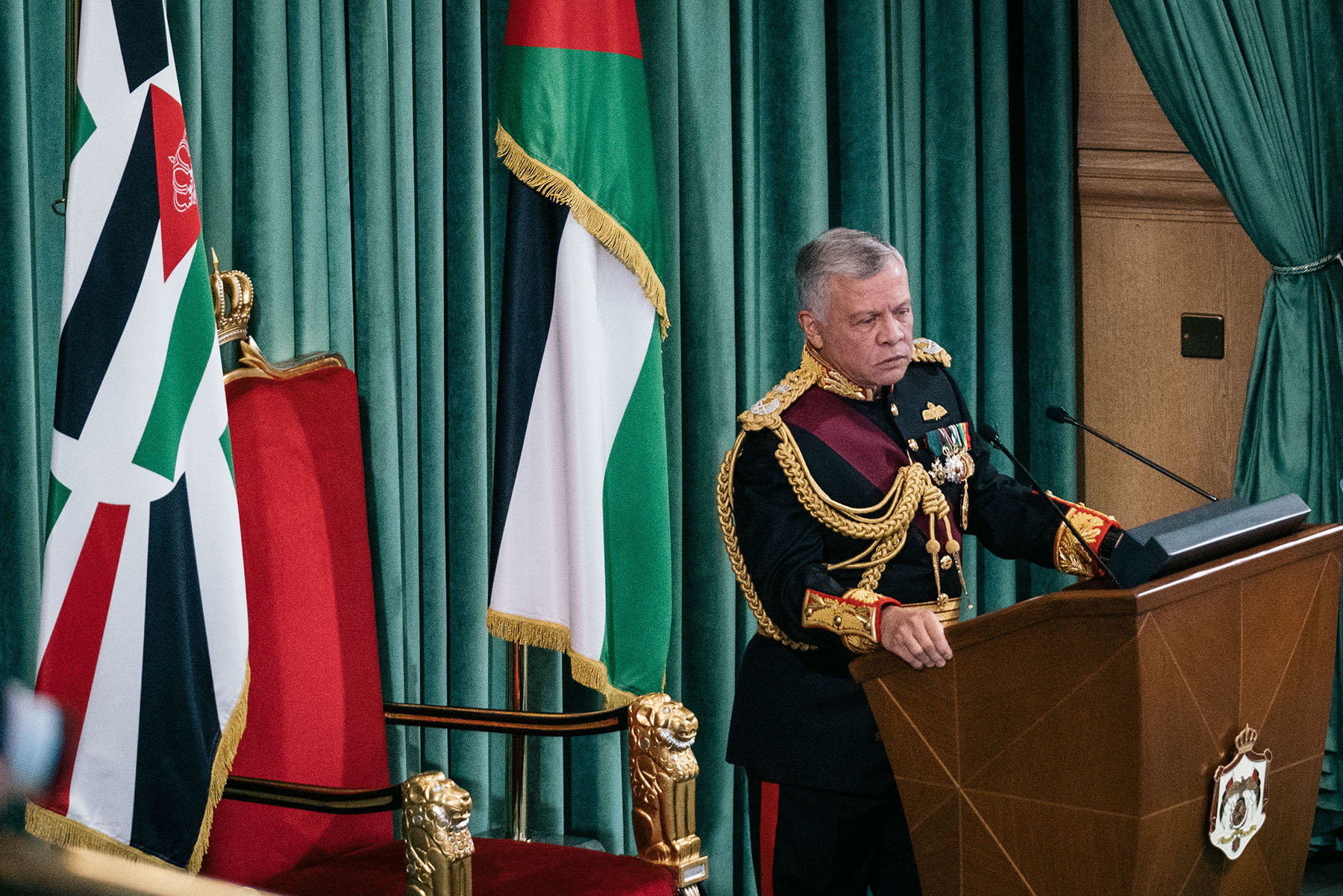Loujain Hathloul Abdullah Alhathloul, Women's Rights Activist
Updated on February 10, 2021.
Summary
Loujain Hathloul Abdullah Alhathloul (sometimes Loujain al-Hathloul) was born on July 31, 1989, in Jeddah, Saudi Arabia, and is one of the country's most outspoken women's rights activists. Her activism focuses on three areas: ending the country's restrictive male guardianship system, allowing women to drive, and establishing an association to support women escaping domestic violence, including founding a domestic violence shelter.
State Security forces arrested Alhathloul on May 15, 2018, and held her incommunicado for 35 days before she was able to call her family. Saudi Attorney General Saud al-Mojeb brought formal charges against her on March 13, 2019, almost ten months after her initial detention. Eleven of the twelve charges were general and vague, making no reference to any legal violation; these included "inciting change in the political system" and "participating in the calls for women's rights against the law of the land."
The last charge referenced the "Anti-Cybercrime Law," claiming she used social media to call for the abolition of male guardianship and equal rights for women. In August 2019, Saudi State Security officials offered to release Alhathloul if she recorded a video denying they tortured her. She refused. She remains in jail with her trial ongoing.
The Saudi Attorney General transferred Alhathloul to the Specialized Criminal (terrorism) Court in Riyadh on December 10, 2020. No evidence was presented, other than tweets and public appearances. She may be sentenced soon.
On December 28, 2020, the Specialized Criminal Court in Riyadh convicted her and sentenced her to five years and eight months in prison but suspended half of this period.
Alhathloul was released into parole on February 10, 2021 but still banned from leaving Saudi Arabia .
Methodology
DAWN researchers interviewed 3 family members of the detainee and one other source, and obtained court documents and other information from published sources that we consider to be reliable, as indicated below. Interviews include the following:
- Alia Alhathloul (sister): Interviews on May 12, May 16, June 11, 2020.
- Lina Alhathloul (sister): Interviews on May 16, June 11, 12, 2020.
- Walid Alhathlou (brother): Interviews on June 11, June 12, June 29, June 30, and July 5, 2020.
They are collectively referenced below as "the family."
- Source N: A source very close to Alhathloul. Interviews on March 8, June 9, June 10, and July 3, 2020.
We are not disclosing the identity of this source to protect his security. He is referenced below as "Source N."
We include below links to official documents that we and the family have determined are safe to share.
Personal Background
Alhathloul was born on July 31, 1989, in Jeddah, Saudi Arabia. She studied at the University of British Columbia, where she obtained her BA in French Literature, in 2013. She is currently a MA candidate at Sorbonne University Abu Dhabi in applied sociological research. She was three months away from graduation at the time of her arrest. She speaks Arabic (native), English, and French. Loujain is divorced. Her ex-husband, Fahad Albutairi, was kidnapped from Amman, Jordan at the same time as her arrest. Albutairi divorced her under circumstances that remain unclear, her family said.
Professional Background
Alhathloul is one of the most outspoken women's rights activists in Saudi Arabia.
In 2016, she volunteered to represent the United Nations Global Compact UAE, a United Nations initiative to encourage businesses worldwide to adopt sustainable and socially responsible policies and to report on their implementation. United Nations experts declared that, "Ms. Alhathloul…[has] been instrumental in the movement to allow women to drive, and the push to end male guardianship."
Alhathloul rose to fame in 2013 on "Keek," a social media platform popular among young Saudis in 2011, as a strong young woman commenting on social issues. She became more engaged in political activism when she joined the call to lift the ban on women driving. On October 23, 2013, she drove her father's car from King Khaled Airport in Riyadh to their house, as part of a "driving campaign" in which she and other advocates took pictures of themselves driving in the streets of Saudi Arabia in defiance of the driving ban.
In 2016, she was a leading voice in the movements, "Together We Stand to End Male Guardianship of Women" and "Women Demand the Overthrow of Guardianship," which sought to raise awareness by sharing information about women's rights online.
In 2018, alongside other activists, Alhathloul began working to establish a shelter for women in Riyadh that would later expand to other parts of Saudi Arabia. This shelter aimed to provide a safe haven for women escaping domestic violence as well as help them reintegrate into society. It was to be named "Aminah" ("safe"), according to Source N.
She was nominated for the Nobel Peace Prize 2019 and 2020 and was listed as one of the top 100 Most Influential People of 2019 by Time magazine.
Time And Circumstances Of Arrest
On September 26, 2017, a Royal Decree announced that the government would allow women to drive as of June 2018. That week, an unknown person from the Royal Court contacted her and asked her not to comment about the Saudi decision that allowed women to drive in the Kingdom, according to her family. Nevertheless, on September 26, 2017, she tweeted one word: "Alhamdulillah" ("Thank God").
At the same time, unidentified security agents kidnapped her ex-husband, Fahad al-Butairi, in Amman, Jordan, and flew him to Riyadh in a private jet.
According to Alhathloul's family, on May 15, 2018, State Security forces raided Alhathloul's house in Riyadh where she lived with her then-husband Fahad al-Butairi. After arresting her, they sent her to the General Investigation Directorate Prison in al-Haer in Riyadh and detained her there for several hours. Police then transferred her to the General Investigation Directorate Prison in Dhahban in Jeddah, supervised by the warden of Dhahban, Brigadier-General Adel al-Subhi.
According to the family, at the time of the arrest, officials failed to show a warrant or other order issued by a lawful authority that would authorize her arrest. The arresting officers also neglected to provide verbal confirmation of any laws that she might have allegedly violated that would justify her detention.
Charges
According to the memorandum filed by Saudi Attorney General Saud al-Mojeb, which DAWN researchers have reviewed, the government charged Alhathloul with the following:
- Inciting and inviting to change the political system in the Kingdom and abolishing the Basic Law of Governance to request a new constitution by designing brochures for the campaign.
- Demanding women's rights that Sharia law grants Muslim women.
- Striving to serve foreign agendas inside and outside the Kingdom. "The coordinated agenda includes campaigns in the media for alleged rights and demanding abolition of the male guardianship system."
- Contacting international organizations, Saudi activists, and dissidents outside Saudi Arabia.
- Receiving financial support from a "foreign organization" to visit human rights organizations and to attend conferences and panels to speak about the status of Saudi women.
- Providing recommendations to a foreign organization and to a Saudi human rights activist.
- Contacting a Qatari citizen via WhatsApp to discuss women's rights and to provide her with a report titled "A Comparison on Women's Status in GCC Countries" prepared by a Saudi activist.
- Supporting the organization "Hasem" (the Saudi Association for Political and Civil Rights (ACPRA)).
- Taking advantage of her previous detention and travel ban by including it in her resume when applying for a job at the United Nations.
- Setting up meetings at her father's house with employees of embassies to discuss her experience during her previous detention at al-Haer prison.
- Participating in a documentary with British journalists to speak about her personal experience in prison.
- Producing, preparing, storing, and sending [media] materials that harm the "public order" by the following:a- Using social media apps to connect with individuals who are "enemies of the country."
b- Joining groups on WhatsApp and Telegram with other Saudis to discuss abolishing male guardianship and giving women equal rights.
c-Taking and publishing videos that spread "false information to damage the reputation of the Kingdom." - Violating previous pledges, signed on February 11, 2015, during her 2014 arrest, stating that she was going to abide by the Saudi law and policy.
The Saudi prosecutor requested the following punishments against Alhathloul:
- A guilty verdict.
- Three years of imprisonment.
- Confiscation of some of her possessions.
- Closure of all her social media accounts.
- A "severe punishment that teaches her a lesson and deters others from following suit".
- A travel ban.
Attorney General al-Mojeb cited only articles 6 and 13 of the Anti-Cybercrime Law that prohibits preparing, producing, or publishing any material that threatens the "public order, religious values, public morals, and privacy…." However, the Attorney General ultimately did not pursue the prosecution in the Specialized Criminal Court mandated to hear cases brought under this law, and instead sought to prosecute her in the regular criminal court.
Trial And Legal Proceedings
January 30, 2019:
Under Article 114 of Saudi Arabia's Law of Criminal Procedures (2013), pretrial detention is limited to a maximum period of six months. Because Alhathloul's pretrial detention commenced on May 15, 2018, and that Attorney General al-Mojeb sought to prosecute Alhathloul in the General Criminal Court, she should have been released after six months of pretrial detention, on November 15, 2018.
According to the family's memorandum submitted to the court, which DAWN researchers reviewed, Alhathloul filed a complaint to Attorney General al-Mojeb on January 30, 2019 arguing she should be released because her detention exceeded the period permitted by the Saudi Law of Criminal Procedures of 2013. She also asked for a transparent trial. Al-Mojeb did not respond and did not provide a reason for her ongoing pretrial detention.
March 13, 2019:
Alhathloul's trial commenced, headed by Judge Ibraheem al-Luhaidan , on March 13, 2019 in Riyadh's General Criminal Court, almost ten months after Alhathloul's initial detention in 2018.
On the first day of the trial, a well-known lawyer, Farraj al-Aqla , offered to help. He also tried to convince Alhathloul and the family to "admit" to the charges. Consequently, the family grew suspicious and declined him, deciding to handle the case on their own. Therefore, Alhathloul's only legal representatives are her parents, Hathloul Abdullah Alhathloul and Fatima Hussein Alhathloul.
Attorney General Saud al-Mojeb offered only the following information as evidence:
- Her admission and her statements recorded during interrogation sessions.
- The arrest and inspection report relating to the May 15, 2018 arrest and her confiscated mobile devices and laptops.
March 25, 2019:
During this second hearing, Alhathloul's parents, representing her in court, asked for more time to respond to the prosecutor's memorandum and accusations.
April 9, 2019:
At this third hearing, Alhathloul's parents presented their defense memorandum in court detailing the mistreatement and torture that Alhathloul endured and her innocence of any criminal actions.
April 9, 2019 – January 30, 2020:
Judge al-Luhaidan postponed the trial for nine months, but did not provide a reason for the delay.
January 30, 2020:
At the trial's fourth hearing, after a nine month postponement, Attorney General Mojeb asked for more time to respond to the defense memorandum, but did not explain why he needed more time despite his nine months to prepare.
December 10, 2020:
After a 20-month postponement, the Saudi Attorney General Saud al-Mojeb transferred Alhathloul to the Specialized Criminal (terrorism) Court in Riyadh. At this hearing, the prosecution said it is seeking the maximum sentence of 20 years in prison. Diplomats who tried to attend the hearing told DAWN that court officials falsely told them the hearing was postponed.
In this first hearing at the Specialized Criminal Court, the judges and court cleric told Alhathloul that the charges and the indictment memorandum were identical to those originally presented in the General Criminal Court. After she signed the documents, Alhathloul discovered that, while the prosecutor still accused her of "crimes" related to having contacts with foreigners, he deleted references to the specific British, Dutch and other European people and entities with whom she was accused of communicating.
December 14, 2020:
Alhathloul presented her defense to the judge, Abdullah al-Luhaidan, and others on the Specialized Criminal Court panel. The Attorney General presented tweets and media interviews in which Alhathloul campaigned for women to drive and challenged the male guardianship system in the Kingdom.
December 16, 2020:
Judge Abdullah al-Luhaidan of the Specialized Criminal Court said he would compare Loujain's defense with the prosecutor's response. He announced that the next hearing would take place on December 21, 2020. However, Alhathloul's parents, who represent her in court, received a text message notifying them of a court hearing at another court (the General Criminal Court) on December 17.
December 17:
Judge Ibraheem al-Luhaidan (who has the same family name as the judge on the Specialized Criminal Court) of the General Court held a hearing addressing the allegations of torture against Alhathloul A court clerk briefed her father on a secret report in which Attorney General al-Mojeb denied the torture allegations and claimed that prison cameras do not store photos for more than 40 days. Therefore, he said, there was no evidence available from the cameras.
December 21, 2020:
A hearing took place back at the Specialized Criminal Court, but no verdict was rendered. The court scheduled another session for December 24, 2020.
December 22, 2020:
Judge Ibraheem al-Luhaidan of the General Court gave Alhathloul the report in which Attorney General al-Mojeb denied torture. Al-Luhaidan asked her to respond on the same day. Judge al-Luhaidan then concluded his investigation and sent a report that denies any torture to the Specialized Criminal Court.
December 23, 2020:
The judges in Alhathoul's case, Abdullah al-Luhaidan, and two others at the Specialized Criminal Court, postponed the hearing to December 28.
December 28, 2020:
The judges in Alhathoul's case, Abdullah al-Luhaidan (chair), Mufarreh al-Jundub (member), and Naef al-Jarallah (member) at the Specialized Criminal Court in Riyadh, convicted her under the Counter-Terrorism Law of "attempting to change the Basic Law of Governance," "trying to serve a foreign agenda" and "using the Internet to disturb the public order," according to the official Saudi news service Sapq. The judges sentenced her to five years and eight months in prison and a five- year travel ban that starts after her release. They suspended half her sentence (two years and ten months).
They suspended half her sentence (two years and ten months). Considering the period (according to the Hijri Calendar) she had spent in prison, she was released on February 10, 2021. Upon release, she was placed on probation for three years and can be arrested and ordered to complete her sentence if she "commits any crime," according to the family and the official Saudi news Sapq.
Detention Conditions
The following information relies on a written statement that Alhathloul's family provided to DAWN:
- State Security forces held Alhathloul incommunicado for 35 days from May 15, 2018, to June 19, 2018, before notifying her family of her whereabouts.
- According to Alhathloul, on May 29, 2018, unknown forces transferred her from the General Investigation Directorate Prison of Dhahban/Jeddah to an unknown location (secret prison), where they kept her for six weeks. During the transfer, unidentified men, some wearing black masks, blindfolded and handcuffed her. Later, they interrogated her and tortured her by electrocuting her, beating her, sexually assaulting her (by kissing her and touching her body), and threatening her with rape and death. During the period of secret detention, interrogators routinely berated her with obscenities. Notably, Alhathloul reported that she only observed male staff at the secret prison and no surveillance cameras.
- The officials who tortured Alhathloul include Saud al-Qahtani, the former advisor to Crown Prince Mohammed bin Salman. On more than one occasion, he personally oversaw the torture and sexual harassment. According to Alhathloul, during one session, Mr. al-Qahtani told her: "I'll kill you, cut you into pieces, throw you in the sewer system. But before that, I'll rape you."
- On July 4, 2018, unidentified security forces returned her to the State Security-controlled General Investigation Directorate Prison in Dhahban/Jeddah.
- On December 14, 2018, State Security forces transferred Alhathloul to the General Intelligence Directorate Prison in al-Haer/Riyadh. The Warden of Haer Prison at the time was Colonel Saad al-Salloum.
- For the first four months of her imprisonment, from May 15, 2018 to late September 2018, Alhathloul remained in solitary confinement. According to her family, the cell limited her movements and she rarely received exposure to the sun. As a result, her muscles grew weak, and she became virtually incapable of holding anything in her hands. She would shake uncontrollably and had difficulty standing.
- On January 8, 2019, Alhathloul filed a complaint to Attorney General Saud al-Mojeb through the General Intelligence Directorate Prison Administration in al-Haer/Riyadh. The complaint requested the Attorney General to open an investigation into those who tortured her during the investigation in the secret prison. Attorney General al-Mojeb issued statements simply declaring that female detainees enjoy a good treatment in detention and did not address her complaint or the case.
- According to her family, on July 12, 2019, Maj. Gen Salah al-Jutaily from the Presidency of State Security visited the parents of Alhathlool in their house in Riyadh to "offer" to release their daughter. Two days later, Maj. Gen al-Jutaily made the first visit to Alhathloul in prison to negotiate what she might do to get released. On July 22, Maj. Gen al-Jutaily visited Alhathloul in prison a second time. He separately made a call to her parents to ask them to convince Alhathloul to deny the torture and mistreatment in prison. On August 7, 2019, Maj. Gen al-Jutaily tried to force Alhathloul to record a video denying that they tortured her, and offered to release Alhathloul if she did. She refused.
- On October 10, 2019, Alhathloul wrote a letter to the King in which she described the torture and mistreatment she underwent. According to the family, State Security officers received the letter and they said to Alhathloul that they gave it to Maj.Gen al-Jutaily. He never responded.
- According to the family, on January 7, 2020, Alhathloul's father, Hathloul, visited her as her legal representative. During the visit, Alhathloul gave her father two nearly identical letters directed to the President of the General Criminal Court and the Saudi governmental Human Rights Commission. In the letters, Alhathloul inquired about the reason for: (1) suspending the hearings of the trial; (2) not deciding on the request for temporary release; and (3) not responding to previous requests related to her detention. During the visit, Alhathloul informed her father that the director of the women's section at al-Haer Prison, Sarah al-Salem, had met with her the previous day, January 6, 2020, and al-Salem asked Alhathloul why she did not appoint Farraj al-Aqla as her lawyer. Alhathloul responded that she was not satisfied with his defense memorandum.
- As Alhathloul's father drove back from visiting his daughter in prison on January 7, 2020, he received a call from al-Haer prison asking him to come back, because, he was told, his daughter wanted him. When Alhathloul's father returned to al-Haer Prison, an unnamed officer who said he was acting at the orders of Maj. Gen al-Jutaily asked the father to hand over the two letters, and he did. The officer further explained that only Maj. Gen al-Jutaily can handle and send such letters.
- December 10, 2020:
After a 20-month postponement, the Saudi Attorney General Saud al-Mojeb transferred Alhathloul to the Specialized Criminal (terrorism) Court in Riyadh. At this hearing, the prosecution said it is seeking the maximum sentence of 20 years in prison. Diplomats who tried to attend the hearing told DAWN that court officials falsely told them the hearing was postponed. - December 14, 2020:
Alhathloul presented her defense to the judge, Abdullah al-Luhaidan, and others on the Specialized Criminal Court panel. The Attorney General presented tweets and media interviews in which Alhathloul campaigned for women to drive and challenged the male guardianship system in the Kingdom. - December 16, 2020:
Judge Abdullah al-Luhaidan of the Specialized Criminal Court said he will compare Loujain's defense with the prosecutor's response. He announced that the next hearing will take place on December 21, 2020. - December 21, 2020:
A hearing took place, but no verdict was rendered. The court scheduled another session for December 24, 2020.
Impact On Family
Alhathloul's parents, Hathloul Abdullah Hathloul Alhathloul and Fatima Hussein Saleh Alhathloul, reported that State Security forces have banned them from traveling since March 2018 without any legal process, grounding, or justification.
They also reported that State Security forces searched Alhathloul's house in March 2018.
Prior Prosecutions
2014 Arrest:
Alhathloul was first arrested in 2014 for her efforts to advocate for women's right to drive. On December 1, 2014, police arrested Alhathloul and Maysaa Bint Abdullah Al Amoudi at the Saudi-UAE border for their efforts to drive across the border into Saudi Arabia.
According to the legal memorandum submitted by General Prosecutor Abdullah bin Muhammed al-Duaylaj dated December 16, 2014, a copy of which DAWN researchers have reviewed, the Chief of Police of al-Udeid Governorate, Nabeel al-Souygh, ordered police to arrest Amoudi and Alhathloul as they separately crossed the Saudi border from the UAE through the Batha crossing point on December 1, 2014. At the crossing point, according to the police report included in the memorandum, they "closed the car entry lane using their cars with the aim of influencing and agitating the public opinion, and posted this incident on social media."
According to the memorandum, Prosecutor al-Duaylaj received an updated report from the Criminal Investigation and Research Division in the Bureau of Investigation and Prosecution (then under the jurisdiction of the Ministry of Interior) stating that "the concerned body observed a number of tweets by the first defendant, [Alhathloul] on Twitter. Such tweets offend the Custodian of the Two Holy Mosques and her tweets always criticize and mock religious or state figures and influence followers."
Alhathloul was arrested at the border and held for 73 days.
According to the memorandum filed by Saudi Public Prosecutor Abdullah bin Muhammed al-Duaylaj describing the trial:
The trial began on December 16, 2014, in al-Ahsa General (Sharia) Court presided by Judge Nasser bin Abdullah al-Sultan. Judge al-Sultan issued his decision on December 25, 2014.
According to the memorandum filed by Saudi Public Prosecutor al-Duaylaj, the government charged Alhathloul as follows:
Upon investigation, Loujain Bint Hathloul Bint Abdullah Alhathloul, is charged with sedition, influencing public opinion, posting tweets and photos that offend the public order and religious values, agitation against the ruler, offending the Custodian of the Two Holy Mosques, offending the Kingdom and its people, mocking public officials, taking photos of police stations at the border crossing for debasement, and mocking and posting on social media. Further, the second defendant Maysaa Bint Abdullah Al Amoudi is charged with assisting Alhathloul in posting a tweet for sedition, influencing public opinion on social media, offending the public order and religious values, and for her lack of responsiveness to the passport officers.
According to the Prosecutor's memoranda, both defendants were charged based on the following information offered as evidence:
- A letter by the Director of Passport Border Crossing, Nabeel al-Souygh, states that the defendants came to the border crossing and insisted on entry, disrupting functioning lanes.
- A technical report by the Anti-Cybercrime Section on the tweets and video clips posted by Alhathloul, where she incites women to drive cars in Saudi territory and seeks to influence public opinion.
- A technical report No. (26) issued by the Anti-Cybercrime Section, which states that Alhathloul led several campaigns with the aim of influencing public opinion, sedition, and organizing collective action.
- Alhathloul's admission to these acts.
- Alhathloul's admission to posting tweets that offended the Custodian of the Two Holy Mosques.
- Contents of the inspection record for WhatsApp chats showing that the Amoudi supported Alhathloul.
Judge al-Sultan dismissed the case by claiming it was outside the court's jurisdiction as a "national security" case. He referred the case to the Specialized Criminal Court instead. The court released the defendants.
The Specialized Criminal Court did not reopen the case.
According to Source N, who provided DAWN with a copy of the legal documents presented in court and which DAWN has reviewed, Alhathloul spent her 73-day detention (from December 1, 2014, to February 11, 2015) in Dar ar-Ri'ayah (al-Hafouf, al-Ahsa Juvenile Prison in the Eastern Province). The al-Ahsa police held Amoudi in the General Prison in al-Hafouf, al-Ahsa in the Eastern Province.
Alhathloul was held in solitary confinement for the first few days. According to Alhathloul's testimony as reported by Source N, the police allowed Alhathloul only one piece of cloth to cover her private areas during her physical inspection.
Before the secret police (Al-Mabahith) released Alhathloul and Amoudi on February 11, 2015, they forced both to sign pledges not to speak about their experiences in prison, according to Source N.
Alhathloul and Amoudi received no compensation for their arrest or mistreatment while imprisoned.
Between February 2015 to October 2015, the Ministry of Interior banned Alhathloul from travel.
In June 2017, State Security forces took Alhathloul into custody at Haer Prison, Riyadh for three days but released her on June 7, 2017, without charge or information about the legal grounds for her arrest.
Violation Of Rights
The detention of Loujain Alhathloul violates various provisions of domestic and international law. Article 9 of the Universal Declaration of Human Rights ('the Universal Declaration') establishes that "no one shall be subjected to arbitrary arrest, detention or exile." Other human rights documents build on the scope of this core right, including the Body of Principles for the Protection of All Persons under Any Form of Detention or Imprisonment ('Body of Principles') and the Arab Charter on Human Rights. Under these instruments, the actions of the United Arab Emirates and Saudi Arabia in imprisoning Loujain constitute arbitrary detention, and thus a grave breach of her human rights. They have not only arbitrarily detained her, but they have also violated her rights to freedom of speech and freedom from torture.
The United Nations Working Group on Arbitrary Detention ('Working Group') hears claims from individuals who have been deprived of their liberty arbitrarily or inconsistently with international human rights law. The Working Group has found that detention is "arbitrary" when it fits into any one of the following categories:
- When it is clearly impossible to invoke any legal basis justifying the deprivation of liberty.
- When the deprivation of liberty results from the deprivation of the exercise of the rights and freedoms granted by certain other rights in the Declaration or the International Covenant on Civil and Political Rights, including the right to freedom of speech.
- When the right to a fair trial has been so gravely breached that it gives the deprivation of liberty an arbitrary character.
- When asylum seekers, immigrants, and refugees are subjected to prolonged administrative custody without the possibility of administrative or judicial review or remedy.
- When the deprivation of liberty constitutes a violation of international law on the grounds of discrimination, including discrimination as to political opinion, that aims towards or can result in the ignoring of equality of human beings.
On June 12, 2020, the Working Group concluded that, in their treatment of Alhathloul, the UAE and Saudi authorities have breached Article 9 of the Universal Declaration in conformity with Categories I, II, III, and V, in addition to numerous other breaches of the Universal Declaration, set out in full in para. 100 of the Opinion.
Alhathloul's detention also violates the requirements of Saudi Arabia's Law of Criminal Procedures, which prohibits pretrial detention for more than a six month period.
Violations by the UAE
Arbitrary Deprivation of Liberty
The arrest of Alhathloul and her forced transfer to Saudi Arabia on March 3, 2018 lacked a legal basis. A "legal basis" under international law does not simply require a law under which the individual may be charged; it further requires that the authorities invoke that legal basis and apply it to the case (see, Opinion 10/2018 para. 45). Alhathloul was not presented with a warrant, given the reasons for her arrest, or told what charges were being brought against her. She had no opportunity to challenge the arrest before judicial authorities in the UAE. Further, the UAE bypassed its regular extradition procedure when transferring her to Saudi Arabia. These actions and omissions by the UAE resulted in Alhathloul's enforced disappearance, whereby the state did not acknowledge the deprivation of liberty and concealed the fate and whereabouts of her, the disappeared person.
Second, Alhathloul was detained precisely because she was exercising her freedoms under other articles of the Universal Declaration.
Third, the UAE denied Alhathloul's right to a fair trial to the extent that makes her detention an arbitrary deprivation of liberty under Article 9 of the Universal Declaration. The UAE violated due process by transferring her to another country without granting access to an independent and impartial tribunal (see, Opinion No. 33/2020, para. 63). As such, Alhathloul's extradition violated the principle of nonrefoulement and Article 3 of the Convention against Torture and Other Cruel, Inhuman or Degrading Treatment or Punishment. This leads to the conclusion that the detention was also arbitrary under the Category III definition.
Fourth, the UAE arbitrarily detained Alhathloul under the Category V definition, as she was detained in a discriminatory manner on the basis of her political opinion.
Violations by Saudi Arabia
Arbitrary Deprivation of Liberty
Saudi Arabia's actions in detaining Alhathloul after her forced transfer on March 13, 2018, and in arresting her at her home in Riyadh on May 15, 2018, had no legal basis under international human rights law. The authorities did not provide her with a warrant, nor did they promptly inform her of the reasons for her arrest and the charges she would face. The government held her incommunicado between May 15, 2018, and June 19, 2018, without access to her family or a lawyer. She was subjected to enforced disappearance in an unknown hotel in Jeddah between May 21, 2018, and July 4, 2018. The practice of enforced disappearances is a particularly aggravated form of arbitrary detention (see, Opinion No.82/2018, para. 28). Indeed, the state first brought Alhathloul before a judge on March 13, 2019, nearly 10 months after her arrest in May. Her pre-trial detention did not rely on individualized consideration of the relative risk she posed and forces never considered alternatives to her imprisonment. As a consequence, Saudi Arabia's treatment of Alhathloul violates Article 9 of the Universal Declaration (see, Opinion No. 33/2020, para. 76). Further, by refusing to allow Alhathloul to bring forth proceedings challenging the lawfulness of her arrest, Saudi Arabia also contravened principles 11, 32 and 37 of the Body of Principles, which establish the necessity of judicial safeguards in cases of liberty deprivation.
Freedom of Speech
Alhathloul's detention came as a result of Saudi Arabia's reaction to her exercise of the rights granted to her by the Universal Declaration.
The Right to Humane Treatment and the Prohibition of Torture
Finally, and most gravely, the Working Group found that Alhathloul has made credible allegations of torture during her detention, including two-month solitary confinement, electrocution, flogging, waterboarding, sexual assault, and threats of rape and death. Article 5 of the Universal Declaration and Articles 2 and 16(1) of the Convention against Torture and Other Cruel, Inhuman or Degrading Treatment or Punishment prohibit the practice of torture absolutely.
The Special Rapporteur on torture and other cruel, inhuman, or degrading treatment or punishment has found that solitary confinement beyond 15 days and incommunicado detention may amount to torture under Article 1 of the Convention against Torture. This finding relies on evidence that such treatment can cause lasting psychological damage.
The case has now been referred to the Special Rapporteur on torture and other cruel, inhuman, or degrading punishment.
Conclusion
Saudi Arabia and the UAE, in their treatment of Alhathloul, have demonstrated manifest disregard for international human rights law. The Working Group's damning judgment, in which it ordered Saudi Arabia to immediately release her and compelled both the UAE and Saudi Arabia to provide substantial reparations, confirms this fact. Further investigations, including by the Special Rapporteur on the promotion and protection of the right to freedom of opinion and expression and the Special Rapporteur on torture, will hopefully determine the extent of the governments' breaches. Nevertheless, it has been clear from the outset that Alhathloul has suffered an unconscionable violation of her rights under the Universal Declaration.
Officials Involved In Prosecution And Detention
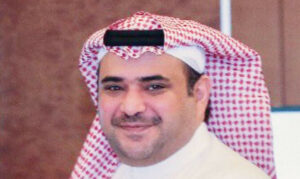 1- Saud al-Qahtani, former senior Consultant to the crown prince
1- Saud al-Qahtani, former senior Consultant to the crown prince
According to Alhathloul's family, al-Qahtani, the former advisor to Crown Prince Mohammed bin Salman, oversaw her torture during her detention in a secret prison. According to Alhathloul's family, she was interrogated and subjected to psychological and physical torture by state officials, including al-Qahtani, in the first few months of her detention approximately from May to October 2018. This torture included electrocution, whipping, waterboarding, sexual harassment, threats of rape and sexual assault, and sleep deprivation. He oversaw the torture on multiple occasions. According to family members, during one of the sessions, al-Qahtani told her, "I'll kill you, cut you into pieces, throw you in the sewer system. But before that, I'll rape you."
2- Maj. Gen. Salah al-Jutaili, Director of Legal Affairs in the Presidency of State Security
[PHOTO NOT AVAILABLE. IF YOU HAVE PHOTOS AVAILABLE, PLEASE EMAIL SAUDIINFO@DAWNMENA.ORG]
As head of the legal department, Maj. Gen. Salah al-Jutaili oversees negotiations, interrogations, house search, and legal operations within the State Security facilities and prisons. The Presidency of State Security has been responsible for unjust arrests, interrogations, and mistreatment inside the prisons it runs. In addition, Al-Jutaili was personally involved in Loujain Alhathloul's case.
He called her to his office about a week before her arrest, on approximately May 8, 2018. He verbally abused her, threatening to force her to stop her peaceful activism.
According to eyewitnesses, in July and August 2019, Major General Salah al-Jutaili tried to pressure Alhathloul and her family by dangling out the possibility of her release, if she agreed to write a statement and record a video in which she would deny torture and mistreatment.
In January 2020, Major General al-Jutaili confiscated two letters from Alhathloul's family in which Alhathloul complained about the lack of due process and her mistreatment.
3- Brigadier-General, Adel al-Subhi, Warden of Dhahban Prison in Jeddah
[PHOTO NOT AVAILABLE. IF YOU HAVE PHOTOS AVAILABLE, PLEASE EMAIL <mailto:SAUDI@DAWNMENA.ORG">SAUDIINFO@DAWNMENA.ORG]
Brig. Gen. Adel al-Subhi is the warden of Dhahban Prison responsible for the treatment of those confined there. Alhathloul was held there in solitary confinement from July to September 2018, without justification.
 4- Attorney General Saud al-Mojeb
4- Attorney General Saud al-Mojeb
As Attorney General, al-Mojeb bears overall responsibility for prosecuting criminal cases, including Alhathloul for her peaceful speech and activism, which are protected by international human rights law. Al-Mojeb kept her in arbitrary and pretrial detention for long periods of time, including months when she was held without access to a lawyer and without being charged with a crime. Al-Mojeb also ignored a 2019 request by Alhathloul to investigate her claims of torture during her detention in 2018. He has unjustifiably asked for the postponement of her trial for 20 months, as of November 16, 2020.
 5- Lieutenant Colonel Ali bin Rashid al-Zahrani, current Warden of Haer Prison (General Investigation Directorate Prison in al-Haer) since September 2019, Riyadh.
5- Lieutenant Colonel Ali bin Rashid al-Zahrani, current Warden of Haer Prison (General Investigation Directorate Prison in al-Haer) since September 2019, Riyadh.
Al-Zahrani bears overall responsibility for the treatment of prisoners in Haer Prison.
During his time as warden, from May 2020 to October 2020, prison officials prevented Alhathloul from receiving visits or phone calls.
Al-Zahrani said these measures were taken to prevent the spread of Covid-19, but the family noted that even phone calls were denied.
Local Saudi Coverage
Since Alhathloul's 2018 arrest, government-aligned Saudi media outlets have issued vicious and slanderous attacks against her, in an apparently orchestrated campaign to turn public opinion against her. The articles and tweets used nearly identical language to describe Alhathoul and other detained women's rights activists. The following are examples:
- Official Saudi Press Agency, May 19, 2018
General Security spokesperson for the Presidency of State Security announced, in reference to Alhathloul: We have arrested seven people who initiated suspected communications with external parties that support their activities and the recruitment of people working in sensitive government positions.
- Al-Jazirah Newspaper (not to be confused with Qatar-based Al-Jazeera News) May 5, 2018, Issue Number 16669
In an article headlined, "The Country Rejects the Traitors," the newspaper published a picture of Alhathloul with the accusations that she "initiated suspected communications with external parties that support their activities and the recruitment of people working in sensitive government positions."
The front page of the paper copy of Al-Jazirah Newspaper featured pictures of Alhathloul and previously-detained women's rights activist, Aziza Alyousef.

- @Saudinws50, a twitter account aligned to the government, tweeted on May 18, 2018, the following image, showing
red stamps over women's activists' pictures, including Alhathloul, reading "traitor."
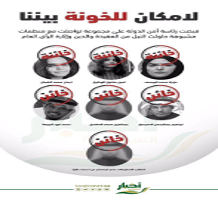
https://twitter.com/Ana3rabeya/status/997654098718744578?s=20
- The Twitter account @Infographic_KSA, aligned with the government, also tweeted an image of the detained women's rights activists, including Alhathloul, dubbing them "traitor."
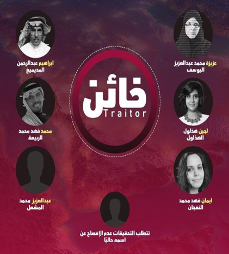
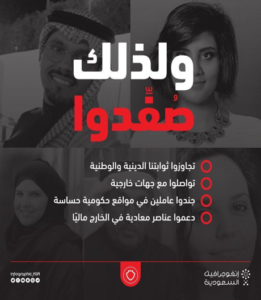
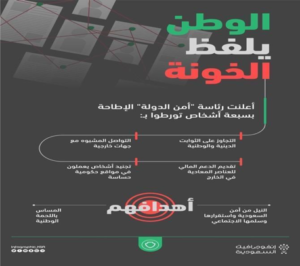
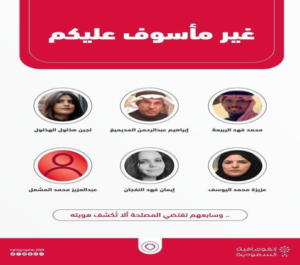
- Saudi TV featured stories on May 18, 2018 charging Alhathloul with contacting foreign parties:
https://twitter.com/saudiatv/status/997651641825406976?s=20
https://twitter.com/alradar101/status/997650012644560896?s=20
- Okaz Newspaper, a government-aligned newspaper, ran a story on May 19, 2018, headlined, "Treason will not Defeat Us: We're the Nation", in reference to Alhathloul's arrest.

https://twitter.com/OKAZ_online/status/997644461562875904?s=20
https://www.okaz.com.sa/local/na/1642263
- Sabq, a government-aligned newspaper issued a story on May 19, 2018, entitled, "Suspicious 'Struggle'"
It issued the names of the detained activists, although the Saudi government claims it does not release the names of defendants unless they are prosecuted: "Learn the names of those arrested: four men and three women, including Loujain Alhathloul."
- Twasul News, a government-aligned news outlet, issued a story about Alhathloul entitled, "Destabilizing the C"
- Al-Madina newspaper issued a front-page story on May 19, 2018, that reads "Arrests of 7 Individuals for their Contacts with Foreign Entities"
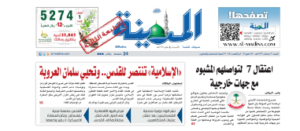
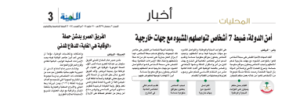
https://www.al-madina.com/uploads/pdf/2018/05/19/madina-20180519.pdf
- Al-Madina Newspaper, a government-aligned newspaper, issued a front-page story on May 20, 2018, with the following headlines:, "Espionage," "EmbassyAgents," and "They Went to Suspicious Groups and Sold the Nation!"
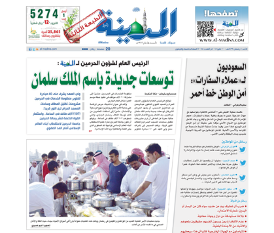
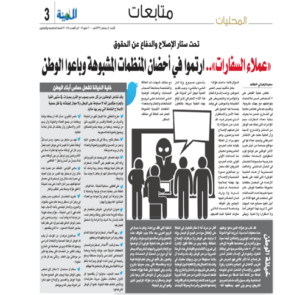
https://www.al-madina.com/uploads/pdf/2018/05/20/madina-20180520.pdf
- Alwatan, a government-aligned newspaper, issued an article on May 20, 2018, titled, "Reflections on the Embassies' Agents."

- Alkhaleej News, a UAE government-aligned newspaper issued an article on May 23, 2018, entitled, "Qatar operation. Alhathloul Headed the Intelligence Cell."
International Reactions
In February 2019, the UN's Committee on the Elimination of Discrimination against Women (CEDAW) called on Saudi Arabia to release Alhathloul.
Saudi Arabia: UN women's rights committee urges Loujain Alhathloul's release from detention
In March 2019, Iceland's UN Ambassador delivered a joint statement to the UN Human Rights Council, on behalf of 36 countries calling for the release of all Saudi prisoners who had been detained for exercising free speech, as well as for an independent investigation into the murder of Jamal Khashoggi.
At the 500-day mark of her imprisonment, a group of independent experts on the UN Human Rights Council, from 12 nations across the globe, condemned Alhathloul's imprisonment and alleged torture.
Amnesty International reported that Saudi authorities have detained Alhathloul since May 2018, after she campaigned publicly for women's equality.
Human Rights Watch issued a statement calling for the immediate release of human rights activists jailed for their advocacy work, including AlHathloul.
The United States' State Department released a 2019 Human Rights Report on Saudi Arabia, detailing numerous violations of human rights standards in the Kingdom, including the jailing of Alhathloul.
During the COVID-19 pandemic, the Gulf Centre for Human Rights renewed its call for the release of detained human rights activists in the MENA area. https://www.gc4hr.org/news/view/2349
In March 2019, PEN America, an organization focused on press freedom, awarded the 2019 PEN/Barbey Freedom to Write Award to Alhathloul, along with two other Saudi activists.
In June 2020, the UN Working Group on Arbitrary Detention found that Alhathloul's imprisonment violated international law.
In September 2020, Denmark delivered a joint statement at the UN Human Rights Council on behalf of 29 States raising their concerns over the human rights situation in Saudi Arabia and calling for the release of Alhathloul and other women human rights defenders.
On the day she left prison, US President Joseph Biden said releasing her was the right thing to do.
French President Emmanuel Macron also welcomed her release.



























